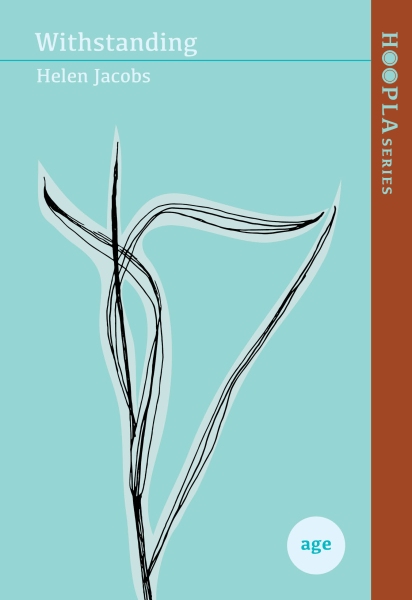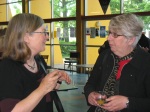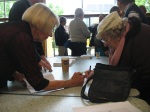Dried Figs by Helen Jacobs. Christchurch: Sudden Valley Press (2012). RRP: $20. Sb, 60pp. ISBN: 9780986452918.
Reviewed by Patricia Prime in Takahē 79, August 2013
Dried Figs is the sixth collection of poetry by Helen Jacobs who is a long time member of the Canterbury Poets Collective.
Dried Figs is an accomplished, finely wrought gem of a book. It contains poems that pull you into them gently and quickly, and then as you proceed through the book you keep hearing echoes of what has gone before, and echoes of what is to come. The past and the present are two common pulses that beat through the collection, each one viewed from different angles each time they are approached or mentioned. In the fine poem, “The Language of Poetry”, for example, the poet recalls eating dried figs:
It operates in the past now
the language of poetry,
and I eat dried figs.
In the poem, “Old and Older”, Jacobs says,
In my ninth decade
What more is there to say
About lost loves, lost physique,
Lost gardens and growing regrets.
Lamentation too is a constant and in “Lament” it becomes “summer hid in whirlwind and where were the days / of daisies dallying under warm sprays / wet and diving” and in “Counting Down” there’s “another funeral” where “I counted more walking frames.”
Jacobs works with histories that are known and histories that she takes and reshapes. She uses this material – for example, sitting in the garden, in the poem “Garden Seat” where she rests and contemplates the young – in a way that makes you believe a poet can reach into the past and make language and life new again seen through a prism and given new life. This is not easy, but Jacobs does it with lightness of touch.
Each poem in this collection is carefully paced and carefully placed, There are two sections: Counting Down and Maps; the first considers the past; the second considers the present. Knowing this, however, doesn’t convey the subtlety of Jacobs’ language or the ways in which her poems are so beautifully in possession of their forms. They occupy the space on the page with elegance and confident simplicity, as we see in the opening lines of “Maps”:
Here, and here, are where memories locate,
an occupation for sitting old,
recollections guiding the morning away
while the present quivers.
Jacobs’ material is personal, and any information she has included has been well observed so that it can arrive in the poem as an essential part of it. This makes her work insightful, emotionally astute, and it allows for a breadth of perception. I love the poem “Interval” which was written after the Christchurch earthquake on February 22nd and encapsulates the need to take every day as it comes and to try and retain a life as ‘normal’ as possible:
do daily what you have always done
perhaps the order different
but it runs on, as talk does,
and “Canterbury Plains”, which captures perfectly the changing seasons and the disappearance of ‘small life’:
The colours of the land are changing
Shades of ochre have turned to green
no corner is left for the wild ones
gone are the hidden, the unseen.
On a different note Helen Jacobs’ Dried Figs says much in a few lines. She writes of ‘God’s hand’ in the poem “God Being Audible” which makes our spirits lift, and ‘we look for revelations / in stones and river currents. / We read instructions in the cast of bones.’ Jacobs asks, if God’s voice is only available to the prophets. This prompts us to query whether in this modern day world we can still be in touch with the Almighty or have we been left to our own devices. In effect the poem achieves much in a few spare lines. Dried Figs does not cower in the face of ageing, pain, loss or difficulties. It is deeply hopeful, and the grit of Jacobs’ love for her city manages to seep through. In the final poem, “Some Other”, she sums up life and its ending in these succinct lines:
Does the butterfly in perfection for a day
ask more
seeking nectar after the end of flight?
And therein emerges neither answers to questions nor solutions to the problems but an idea that, with dreams and poetry resurrected in language and art, culture won’t be crushed.
This is a lovely book (beautiful cover; beautiful design) by an amazing poet. It is characteristically serious in mood, assured, wide-ranging in reference to life and death (and reflected in its cover and design). The poems may be read as variations upon the main themes with their ideas and meanings a continuous journey and the possibility of discovery remaining open.





























